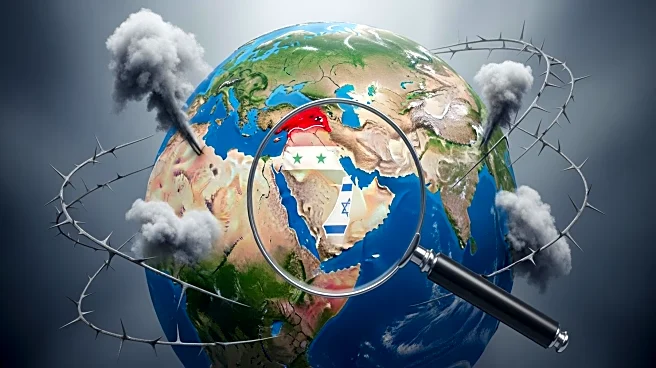What's Happening?
Syrian Foreign Minister Asaad Hassan al-Shaibani has accused Israel of pursuing expansionist goals in the region. This accusation comes amid ongoing tensions between Israel and Hezbollah, as well as broader geopolitical dynamics involving Syria, Russia,
and China. According to al-Shaibani, Israel has exploited the fall of the Assad government to impose destabilizing projects in the region. The Syrian Foreign Minister made these remarks during a press conference at the Lebanese foreign ministry in Beirut. The situation is further complicated by Russia's support for the Assad regime and Syria's efforts to rebuild ties with China. These developments highlight the complex interplay of regional powers and the persistent instability in the Middle East.
Why It's Important?
The accusations by the Syrian Foreign Minister underscore the fragile geopolitical landscape in the Middle East, where multiple state and non-state actors are vying for influence. Israel's alleged expansionist activities could exacerbate tensions with neighboring countries and non-state actors like Hezbollah, potentially leading to further conflict. The involvement of major powers such as Russia and China adds another layer of complexity, as these countries have strategic interests in the region. For the United States, these developments could impact foreign policy decisions, particularly in terms of military presence and diplomatic engagements in the Middle East. The situation also poses challenges for regional stability and security, affecting global energy markets and international relations.
What's Next?
The ongoing tensions between Israel and its neighbors, including Syria and Hezbollah, are likely to continue. The international community, including the United States, may need to engage in diplomatic efforts to prevent further escalation. Monitoring the actions of major powers like Russia and China will be crucial, as their involvement could influence the balance of power in the region. Additionally, any military actions or diplomatic initiatives by Israel could have significant repercussions, potentially drawing in other regional and global actors. The situation remains fluid, with potential for both conflict and diplomatic resolution.
Beyond the Headlines
The accusations against Israel highlight the broader issue of territorial disputes and national sovereignty in the Middle East. The historical context of these conflicts, including the legacy of colonial borders and the Arab-Israeli conflict, continues to influence current events. The role of international law and organizations in mediating these disputes is also a critical factor. Furthermore, the involvement of global powers like Russia and China reflects the shifting dynamics of international relations, where traditional alliances are being reevaluated. These developments could lead to long-term shifts in regional power structures and influence global geopolitical strategies.
















